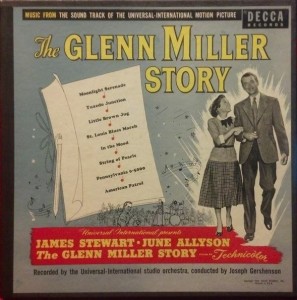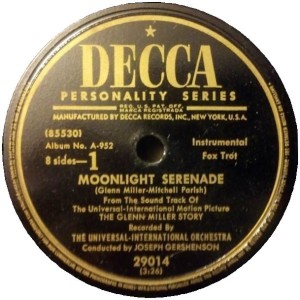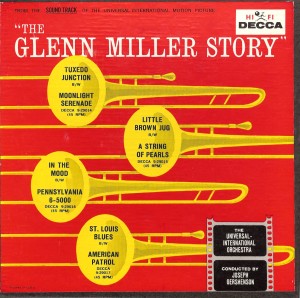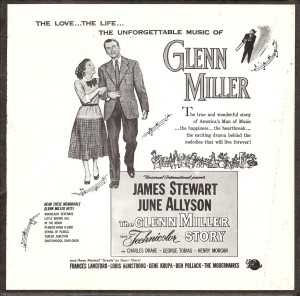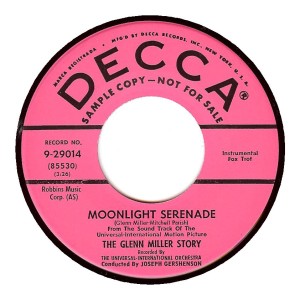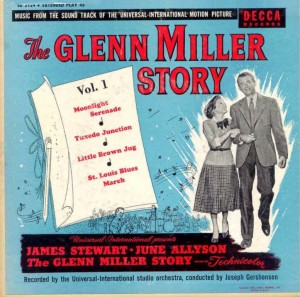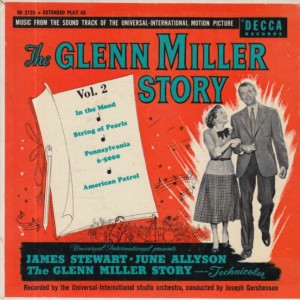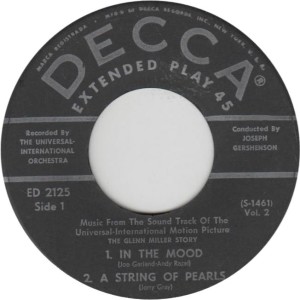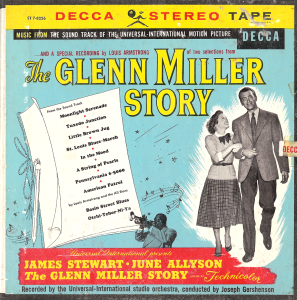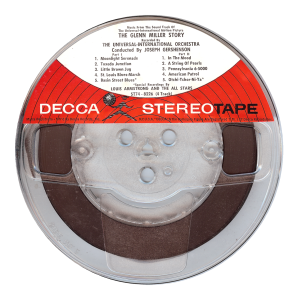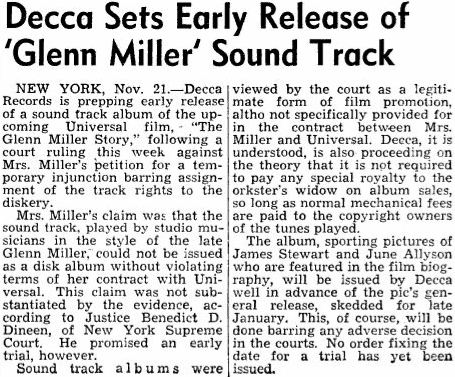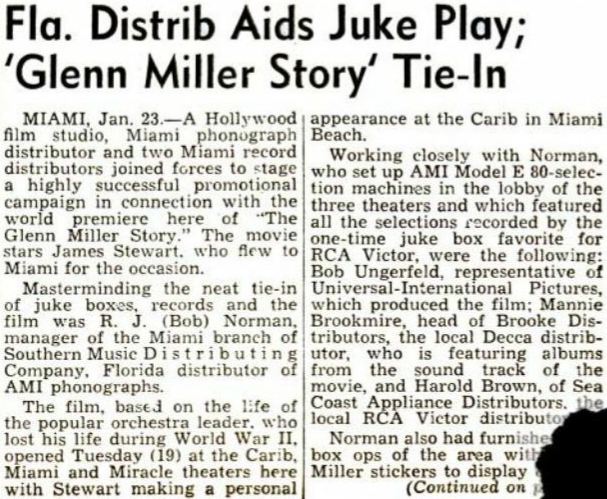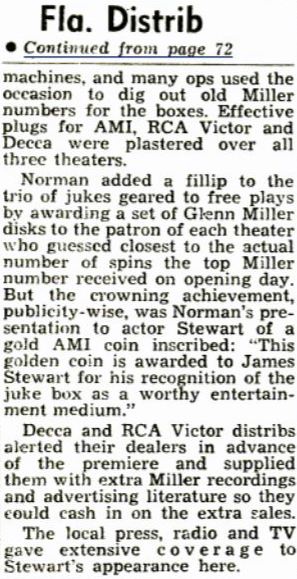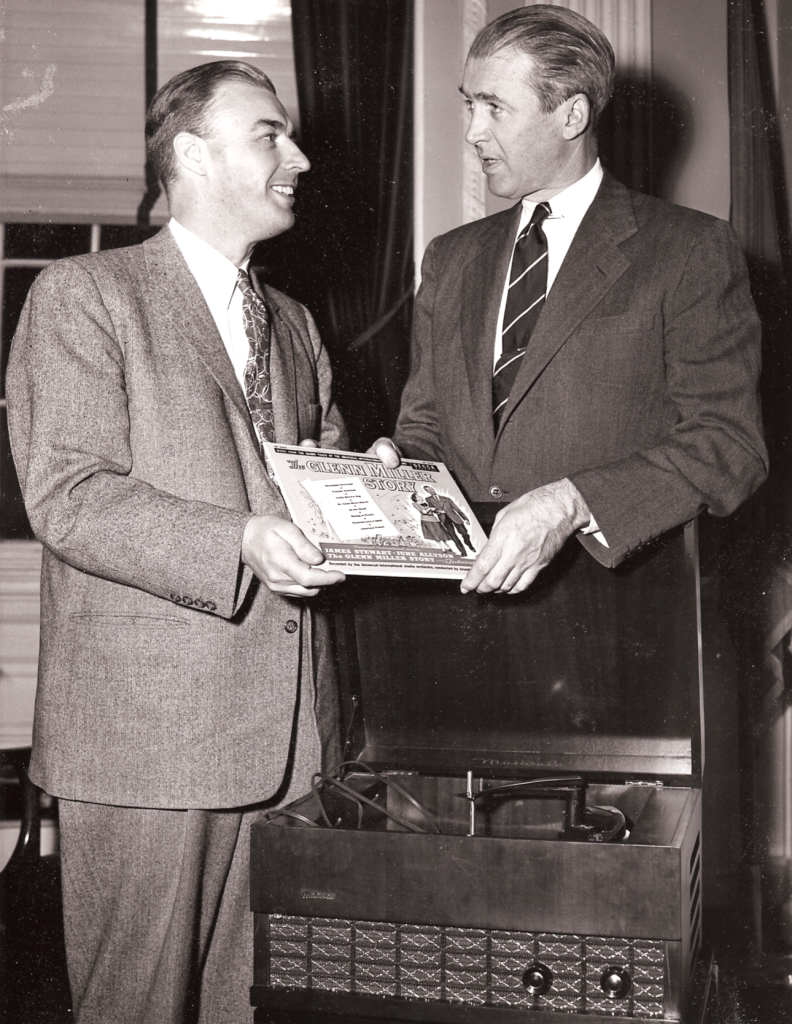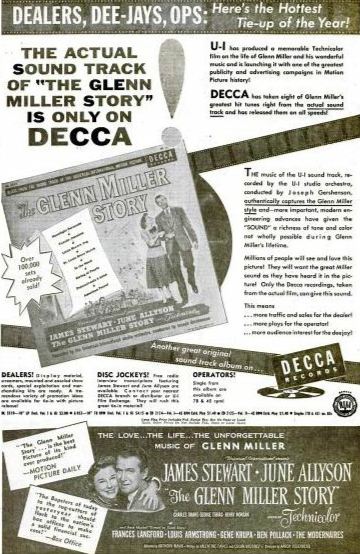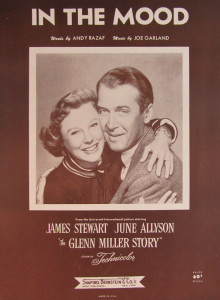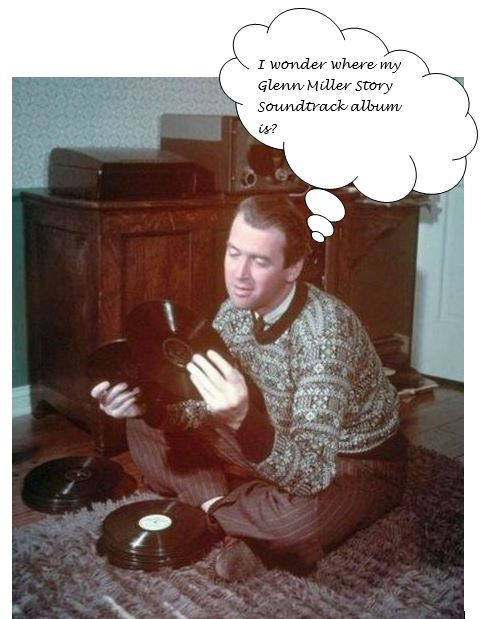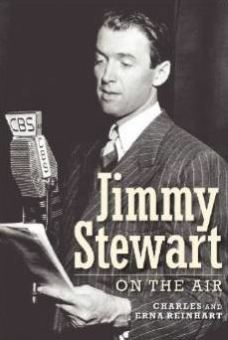Tracing the recording history of The Glenn Miller Story is a very big project, one which will be spread over two blogs. In the first part, presented here, we will take a look at the actual soundtrack materials.
Here is another soundtrack on which Stewart doesn’t appear vocally, but his photo does appear on all the packaging and he did quite a bit to help promote the sales. The music was released in six different formats – 12-inch album, 10-inch album, 10-inch 78 RPM boxed set, 45 RPM boxed set, 7-inch EP and reel-to-reel tape.
Decca DL 8226 (mono)/DL7-8226 (stereo)
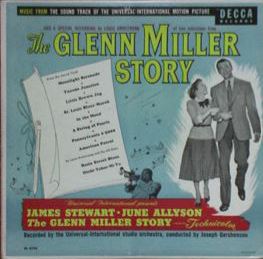
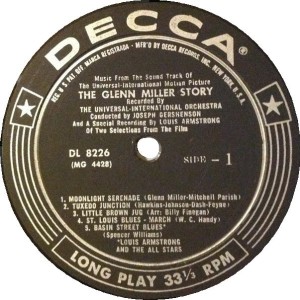 All but two of the tracks on the 12-inch 33 1/3 RPM album are played by the Universal-International Orchestra, conducted by Joseph Gershenson. Henry Mancini was the lead arranger. Chummy MacGregor and Don Haynes, two members of the Glenn Miller band, were brought in by Gershenson to serve as technical advisors during the recording sessions. Six members of the original Glenn Miller Orchestra were brought in to be part of the studio orchestra to add authenticity to the sound of the music. Included were:
All but two of the tracks on the 12-inch 33 1/3 RPM album are played by the Universal-International Orchestra, conducted by Joseph Gershenson. Henry Mancini was the lead arranger. Chummy MacGregor and Don Haynes, two members of the Glenn Miller band, were brought in by Gershenson to serve as technical advisors during the recording sessions. Six members of the original Glenn Miller Orchestra were brought in to be part of the studio orchestra to add authenticity to the sound of the music. Included were:
Babe Russin – alto sax
Willie Schwartz – alto sax, clarinet
Dick Fisher – guitar
Rollie Bundock – bass
Zeke Zarchy – trumpet
Paul Tanner – trombone
Of these six, only Russin and Tanner were actually seen in the film. Other members of the recording band were:
Ralph Collier – drums
Conrad Gozzo – trumpet
Lyman Grandee – piano
Gene LaFreniere – trumpet
Karl Leaf – tenor sax
Ray Linn – trumpet
Murray McEachern – trombone
Blake Reynolds – alto sax
Art Smith – baritone sax
John Stanley – trombone
Joe Yukl – trombone
The other two are by Louis Armstrong and the All Stars. The All Stars are:
Louis Armstrong – trumpet
“Trummie” Young – trombone
Barney Bigard – clarinet
Billy Kyle – piano
Bud Freeman – tenor sax
Kenny John – drums
Arvell Shaw – bass
Neither of the Armstrong tracks is from the soundtrack album. The tracks on the album are:
Moonlight Serenade (Glenn Miller-Mitchell Parish)
Tuxedo Junction (Erskine Hawkins-William Johnson-Buddy Feyne-Julian Dash)
Little Brown Jug (Joseph A. Winner, arranged by Billy Finegan)
St. Louis Blues – March (W.C. Handy)
Basin Street Blues (Spencer Williams) – Louis Armstrong & The All Stars
In The Mood (Joe Garland-Andy Razaf)
A String of Pearls (Jerry DeLange-Jerry Gray)
Pennsylvania 6-5000 (Jerry Gray-Carl Sigman)
American Patrol – March (F.W. Meacham; arranged by Jerry Gray)
Otchi-Tchor-Ni-Ya – Louis Armstrong & The All Stars
Decca DL 5519 (mono)
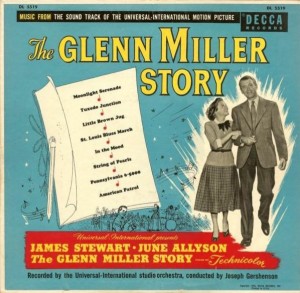
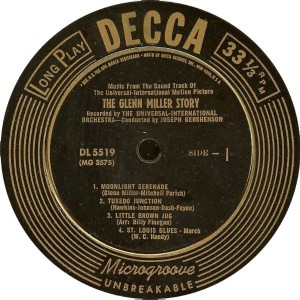 This was a special 10-inch 33 1/3 LP released by Decca. It featured the soundtrack songs, with the two Louis Armstrong tracks being left off the album. The LP entered the Billboard chart on February 20, 1954. It remained on the chart for 40 weeks, ten of those at #1.
This was a special 10-inch 33 1/3 LP released by Decca. It featured the soundtrack songs, with the two Louis Armstrong tracks being left off the album. The LP entered the Billboard chart on February 20, 1954. It remained on the chart for 40 weeks, ten of those at #1.
Decca A-952 (mono)
This was a box set (hinged box) containing four 10-inch 78 RPM records. Again, the Louis Armstrong numbers are not included. The song pairings on the individually numbered discs are:
29014 – Moonlight Serenade/Tuxedo Junction
29015 – Little Brown Jug/A String of Pearls
29016 – In the Mood/Pennsylvania 6-5000
29017 – St. Louis Blues – March/American Patrol
The 45 RPM box set features a different cover than the other releases, with no photo of Stewart and Allyson. But, flip the box over and there’s the photo.
The discs are numbered individually:
9-29014 – Moonlight Serenade/Tuxedo Junction
9-29015 – Little Brown Jug/A String of Pearls
9-29016 – In the Mood/Pennsylvania 6-5000
9-29017 – St. Louis Blues – March/American Patrol
Decca ED 2124 (mono)
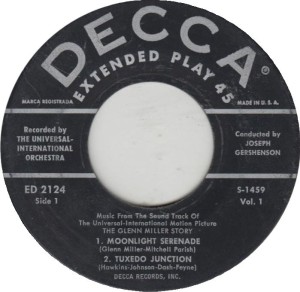 To cover all the vinyl formats, the soundtrack was also released as two 7-inch EP’s, playing at 45 RPM, with cardboard covers. The EP’s were also listed on the Billboard chart, staying eight weeks at #1. Volume 1 featured four songs:
To cover all the vinyl formats, the soundtrack was also released as two 7-inch EP’s, playing at 45 RPM, with cardboard covers. The EP’s were also listed on the Billboard chart, staying eight weeks at #1. Volume 1 featured four songs:
Moonlight Serenade
Tuxedo Junction
Little Brown Jug
St. Louis Blues – March
Decca ED 2125 (mono)
Volume 2 of the EP set has the songs:
In the Moon
A String of Pearls
Pennsylvania 6-5000
American Patrol
Decca ST7-8226 (Stereo)
The tape contains all the songs from the album version, including the two Louis Armstrong tracks.
The album almost wasn’t released because of a lawsuit filed by Miller’s wife. This article from the November 28, 1953 edition of Billboard speaks about the suit and the albums impending release:
A second Billboard article dated January 30, 1954, speaks about Stewart’s work in promoting the album:
Stewart was also involved in other ways to help support the album. The photo below, Dated January 8, 1954, shows Jimmy presenting a 10-inch copy of the album to Massachusetts Lieutenant Governor Sumner G. Whittier. In front of them is a Webcor Musicale phonograph. The phonograph was to be given to a veteran’s hospital in the area for use by paraplegic veterans.
Decca also did its job to help promote the album as shown in this full page ad from the February 12, 1954 edition of Billboard:
Sheet music was also very popular, with every song being issued. Most carried one of the two photos of Stewart and Allyson shown on the samples below.
